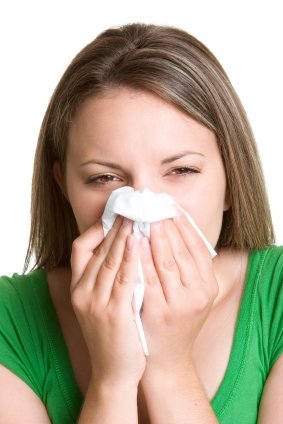Do you have seasonal allergies? Well if you do, you’re not alone. Every year, 36 million Americans suffer from seasonal allergies. To those who don’t have seasonal allergies it doesn’t seem to be that big of a deal. But for those who do, they understand the true misery of seasonal allergies.
So what triggers these annoying allergies? Well the trigger is called allergens. There are two main types of allergens associated with seasonal allergies. These allergens are known as weed pollens and molds. Weed pollens seem to be everywhere during allergy season; in the fields, on the road, yards, gardens, and even on the sidewalk. One plant can generate a billion pollen grains in a season. These grains can travel up to 400 miles. You can imagine it as a floating mine field. Molds, the other trigger, grow in heavy in vegetation, straw, raked leaves, and hay. When it rains outdoor molds become more potent.
When an allergen enters the body, the allergen binds to the mast cells of the person which causes histamines to be released. Histamines induce the symptoms of allergies. Foods such as bananas, cucumbers, melons, zucchini, sunflower seeds, and chamomile tea can also trigger an allergic response much like weed pollen does.
You don’t have to take this, you can fight back! You can fight back by taking matters you’re your own hands. Use the following measures first before resorting to medications.
- Wear a mask when outside especially when dealing with pollen hot zones
- Have air conditioners in your home and remember to change those filers
- Wear a hat and sunglasses to protect those sensitive parts from allergens
- Exercise outdoors either in the mornings or night, or opt to exercise indoors
- Wash your dog so it doesn’t track in pollen
- Shower regularly to wash those pollens out of your body
Sometimes these measures aren’t enough which is when you need treatment. Start by using over the counter allergy medication. If medication isn’t working for you then move up to prescription allergy medications. Nasal sprays work well to reduce that inflammation of the nose. Generally the best ones are Flonase and Nasonex. If you don’t like the nasal route then taking oral medication might suit you better. Popular oral allergy medications include Allegra, Claritin, Zyrtec and Clarinex. If your allergies cause eye irritation it may be best for you to try eye drops. A good eye drop solution is Visine allergy eye drops because it’s safe and effective. If you’re looking for long term solutions then allergy shots might just be the thing you’re looking for. Miniscule dosages of allergens are injected into the body over time in order to build immunity. Remember allergy relief is a marathon not a 50 meter dash, it will take time so be patient.

